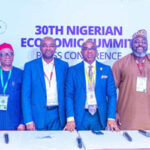The Nigerian Economic Summit Group (NESG) has said Nigeria lost out of $19 trillion invested in negative yielding assets globally due to the country’s unfriendly environment for doing business.
The Chairman of the Nigerian Economic Summit Group (NESG), Asue Ighodalo stated this Monday at the 26th Economic Summit held in Abuja.
- Nigeria slips into recession as economy contracts again
- Appetite for foreign products killing Nigeria’s economy — Minister
“Of the $19 trillion invested in negative yielding assets globally, none of it has been invested in Nigeria, regardless of what it can earn, because our investment environment has been tagged ‘unwelcoming, unsafe, and unpredictable.”
He noted that, “at a time when our fiscal space is constrained, by low revenues and high debt, the need to strengthen the attractiveness of the investment climate to encourage local and foreign investments is of utmost importance.”
He further stated that the world does not trust Nigeria’s commitment to the rule of law and the impartiality and efficiency of our dispute resolution processes.
“Our multiple exchange rates, policy flip flops and perception of how we react to investors, confuses the investing world. These are not labels we can afford particularly now” he stated.
Peace panacea for investment
The NESG further noted that “the current American theatrics notwithstanding, peace and stability remain key investment indicators, and we are in competition with many developing countries across the globe for patient capital.”
“We cannot undo yesterday, but we most certainly can and should manage the fallout with the wisdom and diplomacy that match this moment in time. Our belief at the NESG is that resolution must come through dialogue, advocacy, disciplined, thoughtful, challenges to the status quo in the interest of our collective progress, as well as sincere and concerted resolve to act decisively to bring about required changes.
Time has shown this to be the only way that civilized societies successfully resolve conflict and make traction toward their ideals’ Ighodalo stated.
“The truth of our national ‘Now’ however is this: as far as we may have come, we have not come far enough. We cannot expect young people to thank us for past sacrifices, while we hand them a nation relegated to watching globalization from the sidelines without partaking of its bounty, whilst sharing only in its pandemics and economic shutdowns” he noted.

 Join Daily Trust WhatsApp Community For Quick Access To News and Happenings Around You.
Join Daily Trust WhatsApp Community For Quick Access To News and Happenings Around You.


